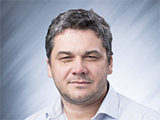IMDEA Networks

“I was always fascinated by scientists but never thought that I could become one of them”
29 October 2015

Interview with Kirill Kogan, Research Assistant Professor, IMDEA Networks Institute
1. To begin this interview, we are curious about how you were called to the life of science. When and why did you decide to become a scientist?
I was always fascinated by scientists but never thought that I could become a real scientist. I assumed that the required entry level is too high. During my work at Cisco Systems I realized that a lot of interesting open research problems still exist and I decided to complete my PhD study to acquire desired theoretical knowledge.
2. What training and background do you have as a researcher?
I have built my experience over the years working for research centers in university and industry such as Cisco Systems, Ben-Gurion University (Israel), University of Waterloo (Canada), and Purdue University (USA).
My research is related to contemporary and future network processing bottlenecks at or between networking devices (primarily, routers and switches). Two main skill sets enable me to fulfill this mission: first, over 12 years of rich practical experience as a system designer at Cisco Systems; second, I am a theoretical computer scientist experienced in solving of complex algorithmic problems.
Research in system design requires a definition of the purpose and desired infrastructure. Only once the infrastructural framework is defined a global problem can be divided into independent micro sub-problems. From my practical experience, I realized that even a micro problem statement under real constraints is unlikely to be attractive to pure theoreticians; simplifying the original problem but still keeping it relevant for practical application can be done only by scientists who understand both the theory and real systems.
3. How did you get the opportunity to come and work in Madrid? What institutions have you been connected to so far?
My original goal was to join a team that is constantly producing significant impact in networked systems research and that could exploit my personal background. I learned about IMDEA Networks from Prof. Srinivasan Keshav when I was a postdoc at University of Waterloo. I was impressed by the level of research and dynamic environment of the Institute.
4. What interested you most about the IMDEA project? What made you want to become involved?
IMDEA Networks provides an excellent ecosystem for researchers to achieve significant contributions in their corresponding areas of interest. The right environment, a strong international team and the understanding that my background and industrial experience in networked systems could be useful for IMDEA Networks motivated me to apply for a position within its research team.
5. In what research lines will you be working? What specific results do you expect to see?
The Internet is built around a large variety of switches and routers, transferring information that is aggregated into packets. These packets are individually forwarded and switched toward their destinations. For the past few years, Internet traffic has doubled every year, and nothing indicates that this growth rate will slow down in the near future. The major part of my research is devoted to efficient algorithms for design of high-speed switches and routers to accommodate the traffic growth in the Internet and increasing complexity of implemented services.
6. Did you know Spain before joining IMDEA? What do you like best about Madrid
I visited Spain only once before joining IMDEA Networks. The impressive cultural offer together with very efficient transportation system make Madrid a desired place to live.

Kirill Kogan enjoys travelling. Here he is at Karlovy Var, in the Czech Republic and at Lviv in Ukraine.


Recent Comments